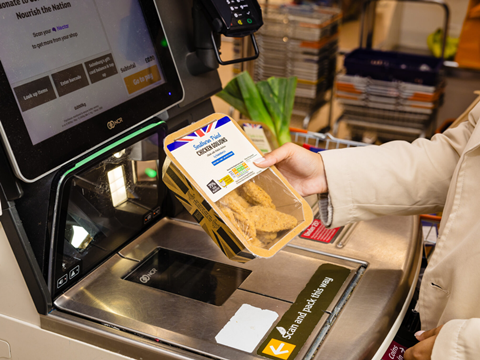
Sainsbury’s intends to save 694 tonnes of plastic annually by selling its own-brand chicken and fish lines in kerbside recyclable cardboard trays, with a new on-pack logo directing consumers towards products sold in reduced plastic packaging.
Instead of conventional plastic packaging, all own-brand salmon fillet trays from Sainsbury’s will now be packaged in cardboard made from sugarcane pulp and lined with a polyethylene film. Said to be a first among UK retailers, the new packaging is set to cut plastic by 70% and save 346 tonnes annually.
Similarly, its Taste the Difference and by Sainsbury’s breaded chicken lines, as well as its Taste the Difference breaded fish fillets, will be distributed in cardboard trays. The transitions are expected to save 300 and 48 tonnes of plastic a year, respectively.
The trays are said to be compatible with kerbside recycling streams, which enables consumers to recycle their packaging waste at home.
Throughout the summer, Sainsbury’s intends to apply the new packaging to seasonal chicken products, including breaded goujons, nuggets, schnitzels, and other products in its finger food and BBQ range.
Claire Hughes, director of Product and Innovation at Sainsbury’s, commented: “With salmon being one of our most popular fish, we made it a priority to reduce the plastic on the packaging of this much loved product as we work towards our Plan for Better goals.
“We are now the first retailer to make the move to have recycled pulp card trays across all our by Sainsbury’s and Taste the Difference salmon products, enabling a whopping 70% plastic reduction. Together with changes to our breaded fish and chicken packaging, we are set to save 694 tonnes of plastic a year – a significant step towards our plastic reduction goals.”
Sainsbury’s has also introduced its Good to Know logo to help communicate its sustainability efforts to consumers, including products sold in reduced plastic packaging. The logo can be found on the new packaging across the retailer’s salmon products.
In another development, Sainsbury’s intends to save over 775 tonnes of plastic every year – the equivalent of over 52 million pieces of plastic annually – by selling all its own-brand mushrooms in cardboard punnets.
Similarly, Tesco is trialling a recyclable cardboard container for two of its most popular avocado lines. If the transition is adopted across Tesco stores, it is expected to save up to 25 million plastic trays.
If you liked this story, you might also enjoy:
How are the top brands progressing on packaging sustainability?
The ultimate guide to global plastic sustainability regulation














No comments yet